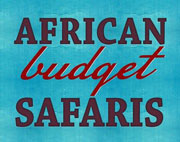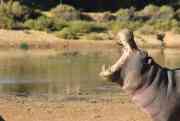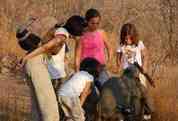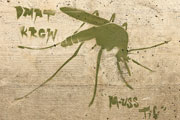Excellent tips on the safety of your family on safari in Africa
Concerned about family safety on safari? Find out how to keep your children safe on African safaris...
- Mozzie repellant? Check.
- Phone charger? Check.
- Tummy tablets? Check.
- Sunscreen? Check.
- Raincoat? Check.
A good checklist will help, but there is more to it than that. Luckily we're more than happy to tell you what you need to know, how to prepare and what to pack (and yes, we do love those Band-Aids with the action heroes on them). Rest assured, we won’t take up three-quarters of your luggage space with unnecessary first aid clutter either.
The thing is, you and your family want an unforgettable African safari experience with minimal drama, fuss or problems and maximum sunsets, scenery and sightings. So, what do you need to know to keep your children safe on African safaris?
 The tall and the short of it by by Lisa H on Unsplash
The tall and the short of it by by Lisa H on Unsplash
Family Safety on Safari
Most of Southern and East Africa is stable and safe. Fact. And because you’ve got your browser open on this page of African Budget Safaris, you are doing your homework. It’s good to know which way the wind blows in the regions you’re planning to visit. As a trusted safari operator, we at African Budget Safaris love prep too. Here, we answer some of the most commonly asked questions about family safety on safari in Africa.
What’s in the news?
African countries are, at times, portrayed by international media as a dangerous place to visit. We’re the first to admit that there are, unfortunately, struggles with a high rate of crime in some places. A worldwide phenomenon? Nevertheless, thousands of safari-goers, visitors and their families travel to Africa every year (and throughout the year) without incident. The rewards of traveling safely whilst you and your family enjoy a safari in this spectacular neck of the woods are most definitely many.
 Jozi by by Keenan Constance on Unsplash
Jozi by by Keenan Constance on Unsplash
Get the inside info. And it’s right here at your fingertips. Visit some news websites to get an idea of the ‘mood’ of the country or region you’re going on a safari in. If you know anyone in the country or have family or friends that have traveled there before, pick their brains. Go down the digital rabbit hole to see what other travelers have to say. “Word of mouth is the best form of advertising.”
When it comes to any health scares when you’re seeing the nurse/doctor at your nearest Travel Clinic – more on that later – ask them to check whether there are any health warnings for travelers. Alternatively (or additionally), you can check on the CDC travel site.
Whatever the weather
The Southern African countries – South Africa, Namibia, Botswana, Zimbabwe and Mozambique – are sunny, dry countries at the foot of the African continent, covering a vast area, and therefore a vast array of climates. Just South Africa’s coastline stretches over 2500 km and there’s an inland plateau that rises to nearly 1600 m above sea level. In the interior, you’ll find mountain ranges rising up to 3400 m high. The country has a rich array of ecological life zones ranging from desert and savannah to fynbos and forest. Protection from changing weather patterns is paramount.
 Storm ahead by by Pop & Zebra on Unsplash
Storm ahead by by Pop & Zebra on Unsplash
As for the seasons down south, they are the opposite side of the coin from those in the Northern Hemisphere. Summer is from the month of October/November to February/March and winter is from May/June to August/September. If the tip of your nose and your ears are freezing in Europe for instance, it is lovely beach weather in South Africa. Many families who go on safari prefer April and September as the temperature is as its ambient best during these months. No scorching sun or heavy downpours.
The further north you go – closing in on the equator – the more tropical it becomes, with seasonal rains specific to each area. For a more in-depth analysis of what’s hot, when, in all of the top safari spots, see our blog 'When To Go Where On Safari: Best Times to Visit'. Do remember, too, that winter, in many places, is prime safari time (see 'Winter’s Here: It’s Perfect Safari Season').
Safety in the water
The east coast – from Durban in South Africa all the way up to Lamu in Kenya – is wonderful for swimming all year round. The balmy Indian Ocean’s temperature ranges from 20°C to 25°C and makes this coastline a splendid safari destination, even during the winter.
The seawater along the Western Cape and Namibian coast is much colder, icy cold in some areas, but offers more opportunities for wind-related water sports such as kite surfing and windsurfing – with a wetsuit!
 Seaside! by by Zany Jadraque on Unsplash
Seaside! by by Zany Jadraque on Unsplash
In total, South Africa boasts with 46 Blue Flag beaches – meaning, they keep the highest standard of clean coastline (and breath-taking sea views!). A grand total of 30 Blue Flag beaches await you in the Western Cape. The popular beaches of Llandudno, Clifton 4th and Camps Bay in Cape Town a.k.a. the Mother City sport prestigious titles. A further nine stretches of coastline get the thumbs-up in KwaZulu-Natal, whereas the mesmerizing Eastern Cape lay claim to seven.
Remember, though, that many beaches along the African coastline are wild and unspoiled and may not have lifeguards on duty. Even the safest-looking beaches may have riptides so, if you have kids, speak to the locals before rushing into the waves and dragging your boogie board behind you. In fact, it’s wise to do so, kids or not.
Can we drink tap water?
It depends on where you’re going. Again, check with your guide before doing so.
Even in South Africa, the quality of tap water can be a little inconsistent, depending on where you are. Here at African Budget Safaris, we recommend that you do your research beforehand. Also, ask the locals whether it is safe to drink tap water in their region. As for drinking water directly from rivers and streams, we don’t advise it, anywhere.
 At the water's edge by by Adam Sherez on Unsplash
At the water's edge by by Adam Sherez on Unsplash
The further north you go, the more likely it’ll be necessary to drink only bottled water (and remember the same applies to ice and to washing any food well) … a child with a bad tummy does NOT make for a fun safari.
Can I see your license?
Sometimes it's easier, with kids, to have your own car. If you plan to go on a self-driving safari or rent a car to travel between reserves or game parks in one or more African countries, check if you’ll need an international driver’s license. They are valid for a full year. Also, do some research on the infrastructure of the country/ies you’re visiting.
Is there an age restriction on African safaris?
There are few things that beat a family holiday, especially one to Southern and/or East Africa with spectacular scenery and abundant wildlife. Take the following into account before bringing the kids (especially small children) into the wild, though.
 Look at the camera by by jean wimmerlin on Unsplash
Look at the camera by by jean wimmerlin on Unsplash
There are quite a number of game reserves that welcome children and offer exciting child-friendly activities. Of course, there are inevitable rules regarding children. Some camps may not allow children under 12 years old. Teenagers, no matter how taxing (!), are good to go.
Essentially, it’s to protect children from danger. Many camps are unfenced, meaning that animals, wild animals, roam freely through them. In most, safari guides walk you to and from your accommodation, but it’s just not safe for the youngest of the young.
 Safari drive by by Wade Lambert on Unsplash
Safari drive by by Wade Lambert on Unsplash
Game drives are all about being in wild, open or dense spaces – here too, an age restriction applies. Patience and keeping quiet at the right time are required on those drives – it’s not fair to expect it from a 2-year-old. Fortunately, there are many wonderful child-friendly camps with dedicated, closed game-viewing vehicles.
African Budget Safaris offers a range of child-friendly safaris, including:
- Kenya to Tanzania Tour - Best Parks, Masai Mara & Serengeti
- 4 Day Southern Kruger Lodge Safari
- 4 Day Budget Greater Kruger Lodge Safari to Klaserie
- Budget Bush & Beach Safari in Kenya
Are we there yet?
Africa – even Southern Africa – is massive. Keep this in mind if your whole family, bar the dog and parakeet, are off on a safari. If you opt for a South African road trip from Skukuza, in the Kruger National Park and Cape Town you’re looking at over 1 800 km (almost 1 200 mi) … that’s about 20 hours in the car with Junior! And that’s on the national road, that is well-maintained. If you choose to go off the beaten track, the ride can get rough.
Kids on long journeys can turn into whining monsters. Plan your trip carefully to break up the driving and save yourselves from the incessant ‘Are we there yet?’
 Game drive: the inside story by by Robson Hatsukami Morgan on Unsplash
Game drive: the inside story by by Robson Hatsukami Morgan on Unsplash
As for the game drives themselves, they generally last upwards of three hours and there are often clumps of time when the animals do a splendid job of staying hidden. You want to hear the call of the lesser-known so and so, not whinging and whining.
Medical insurance – an absolute must-have
We can’t recommend travel insurance enough – for the whole family. In fact, you can’t go on a safari without it. Ensure that the coverage is not only for your financial protection if the trip is canceled, but also to cover medical emergencies due to injury or illness … “I shouldn’t have eaten that extra handful of biltong …”
Remember that many safari camps lie in remote regions – if anyone needs to be rushed to a hospital, some distance would need to be traveled. At African Budget Safaris, we pride ourselves on giving you detailed advice and the essential information to ‘cover all the exists’. See 'Travel Insurance for Africa'.
Take your meds
The last thing you want is for any of your family to contract a disease whilst on safari. Do your research beforehand on what each country you’ll be visiting requires and speak to your nearest Travel Clinic – well in advance – about what vaccinations you need (see our blog, 'Getting your shots: Vaccinations needed for your African Safari') and whether you require malaria prophylaxis (see 'Malaria made easy').
Malaria is a disease that must be taken seriously; this applies especially to young children (under 5 years old). While there is prophylaxis (medicine to prevent malaria) to give both adults and children and mosquito nets to prevent bites, they are not 100% effective. Children, if they get malaria, get it severely and symptoms progress rapidly, so it’s best not to take small children into malaria areas far from medical care.
Hey, before you pull the plug on a safari, it’s not all doom and gloom! There are wonderful, malaria-free safari options in South Africa and parts of Namibia and Botswana. A trip along the spectacularly beautiful Garden Route in South Africa is malaria-free and family-friendly. Oh, and do stop at the Sedgefield Market on a Saturday morning. Come hungry; the fare on offer is ridiculously delicious! We digress …
 Garden Route by by Martijn Vermeltfoort on Unsplash
Garden Route by by Martijn Vermeltfoort on Unsplash
For more detailed information on malaria-free family-friendly safaris, see our blog, 'Family-friendly safaris to malaria-free game parks of South Africa'.
These boots are made for walking
Don’t let a blister take all the joy out of any of your family’s safari trip. If you plan to go on game walks, see that your family is kitted out in sturdy, but light, walking shoes or boots. A good pair of sneakers will also do the trick. If you’re all going to show off your brand-new boots to Granny and Grandpa, buy them well in advance so you guys can break them in.
 These boots were made for walkin' by by Amanda Sandlin on Unsplash
These boots were made for walkin' by by Amanda Sandlin on Unsplash
There’s an unwritten rule that applies to adults and children: when you go on safari, you only need three changes of clothing for the entire trip. Three changes of clothing is enough if you wash and drip-dry your clothing in the African sun. Hygiene is paramount, and the hot African sun will dry your washing in no time. Many of the game reserves and lodges also offer a sparkling laundry service, so you guys needn’t return with a questionable smell hanging around you.
Factor in the African sun
Locals are quick to spot a safari-goer that ignored the advice on proper sunscreen and protection. Visitors from the colder Northern Hemisphere not used to the hot African sun and who have scant respect for it usually turn a neon pink, or even worse, a maddening red from too long in the sun – unprotected. We cringe simply looking at you! Even the lightest clothing will feel like a grater against your skin. You have been forewarned! Sunstroke, for both adults and kids, is not fun.
 Sunshine in Namibia by by Philipp Lublasser on Unsplash
Sunshine in Namibia by by Philipp Lublasser on Unsplash
If you hit the waves or go on a canoe safari or a boat cruise, the sun has one outstanding feature. It is relentless. Protect every bit of skin that is exposed. Throw money at sunscreen with an SPF of 30 or higher, repeatedly. A hat, sunnies and a light sarong is non-negotiable. You don’t go from aaah to aaargh.
First aid kit deluxe
Traveling with kids means more scrapes and such. So, check that you have malaria tablets, lip balm, moisturizer, conditioner, antihistamine cream, insect repellants, a basic first-aid kit with basic analgesics, bandages, antidiarrheals, anti-emetics, antiseptic and, if necessary, water purification tablets. Throw in some packets of tissues and or biodegradable premoistened wipes. Check out the 'Complete safari medical guide' on our African Budget Safaris blog for more.
Listen. Watch. And listen some more.
Whatever happens, don’t get out of your safari vehicle until the guide tells you it’s safe to do so and make sure your kids know this. We live in modern times, but some still think it’s hunky-dory to get out of the vehicle to take a better picture of the animal. This is the wild. You are considered as lunch, especially if you’re small. We don’t want anything tragic to happen.
 Lion by by Andrew Rice on Unsplash
Lion by by Andrew Rice on Unsplash
It’s not only the Big Five you must be cautious of. Wild dogs, hyenas, snakes and their mates abound.
Also, just because you cannot spot any animals at a given moment, doesn’t mean they’re not there. Remember, these guys are camouflage specialists. They are predators and at the top of their game.
 At the fireside by by Varga Benedek on Unsplash
At the fireside by by Varga Benedek on Unsplash
Some beaches have shark nets, some rivers are the domain of crocs and hippos. The list goes on. Simply heed the signs and – most importantly – the advice from your guide, if you want to wrap up your day in front of a campfire with a starry African sky above.
Africa is safe if you are sensible
Families on safari visiting our wilderness very rarely find themselves in high-crime areas and unless you're traveling around Africa on the cheap; you'll stay in upmarket safari accommodation in decent and respectable areas where the management and staff adhere to vital safety measures and precautions needed to keep you safe. In the parks, follow your guide’s lead, and make sure your kids do, too.
 Hip, hip, hippo by by Wade Lambert on Unsplash
Hip, hip, hippo by by Wade Lambert on Unsplash
For a full rundown of safety, pre-safari, on safari, on bush walks, and urban safety, head over to our blog, 'Safety on African Safaris'.
Take this with a pinch of salt … you’re not going to a theme park; you’re not packing in some retail therapy; you’re not driving around the neighborhood. You’re going on a safari. In Africa. You’ll be out of your usual comfort zone, but still comfortably navigating spectacular new terrain. Think logically and listen to the advice of your safari guide.
Walking around swinging that expensive, high-tech camera around your neck is unfortunately not the way to go if you’re opting to visit a nearby city or town. Common sense prevails. Educate your children – and drill it in – that they need to stick with you and take care.
For an overview of the safest places to travel to in Africa see the 10 Safest Countries in Africa to Visit.
 Splash by by Paola Blakovi
Splash by by Paola Blakovi
With a little bit of careful planning and doing your homework, you and our family can enjoy a spectacular safari in Africa – there’s no book or TV program that’ll give your kids a better education on wildlife, conservation, and Africa’s incredible cultures and traditions.
For more advice on keeping your kids safe on safari or to book your once-in-a-lifetime family safari, talk to one of our fabulous and knowledgeable ABS safari consultants now.



 Briony is a qualified pharmacist, published author and travel blogger living in Cape Town. She writes her own blog about travel, the arts, music and the good things in life, with a focus on accessibility. She likes watching the world go by, and sometimes it makes her nose twitchy, but mostly it provides golden nuggets with which to light up the page.
Briony is a qualified pharmacist, published author and travel blogger living in Cape Town. She writes her own blog about travel, the arts, music and the good things in life, with a focus on accessibility. She likes watching the world go by, and sometimes it makes her nose twitchy, but mostly it provides golden nuggets with which to light up the page.












